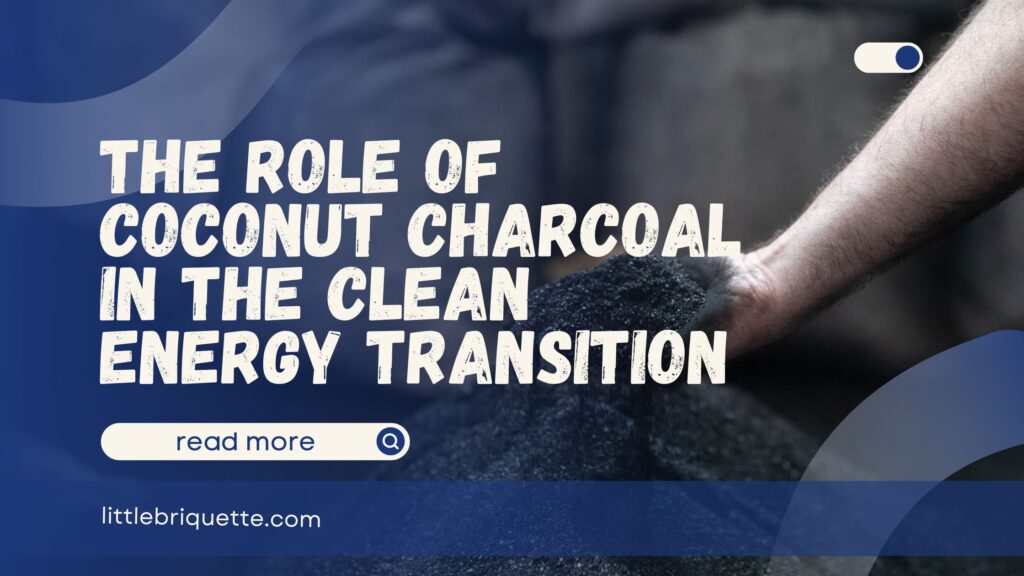The role of coconut charcoal in the clean energy transition is a response to the increasingly urgent global environmental and health challenges. Clean energy refers to energy sources that have minimal impact on the environment, particularly those that do not emit greenhouse gases during their use. This is why coconut charcoal is becoming more popular today for various industries, from cooking and grilling to heating for hookahs.
The Role of Coconut Charcoal
Coconut charcoal, made from coconut shells, is an increasingly recognized fuel in the context of the clean energy transition. This type of charcoal offers several advantages that can contribute to reducing dependence on fossil fuels and minimizing the environmental impact of the energy sector. Here is the role of coconut charcoal in the clean energy transition:
Renewable Energy Source

Coconut charcoal is produced from coconut shells, a byproduct of the coconut industry often considered waste. Using coconut shells to make charcoal allows for the utilization of an abundant and rapidly growing resource, making it a renewable energy source. As coconuts are fast-growing and plentiful in many tropical regions, coconut charcoal offers high sustainability potential, enabling the production of renewable energy in a sustainable manner.
Additionally, by utilizing coconut shells that would otherwise be organic waste, coconut charcoal helps reduce the amount of waste generated by the coconut industry. This not only adds value to previously unused material but also decreases the burden of organic waste management. In this way, coconut charcoal not only provides a clean energy source but also contributes to better waste management, enhancing overall environmental sustainability.
The Role of Coconut Charcoal in Energy Efficiency

Coconut charcoal is known for its high energy density, meaning it can produce significant heat with relatively small amounts of fuel compared to some other types of biomass. This advantage makes coconut charcoal more efficient in use, as less charcoal is required to achieve the desired heat levels. This not only enhances energy efficiency but also reduces the frequency of fuel replenishment, contributing to more practical and economical operations.
Moreover, coconut charcoal burns with a clean and stable flame, producing minimal smoke and ash residue. This clean burning process reduces pollutant and particle emissions that can negatively impact human health and the environment. By minimizing smoke and ash, coconut charcoal helps decrease air pollution and offers a more environmentally friendly alternative compared to traditional, dirtier fuels.
Reduction in Carbon Emissions

Burning coconut charcoal results in lower carbon emissions compared to fossil fuels like coal or oil. This is because coconut charcoal burns more cleanly and efficiently, producing less carbon dioxide, a major greenhouse gas responsible for climate change. By reducing carbon emissions, coconut charcoal contributes to climate change mitigation efforts, helping to lower the carbon footprint of combustion activities and providing a more environmentally friendly alternative.
The production process of coconut charcoal, which involves high-temperature burning, can also sequester carbon within the charcoal’s structure. During pyrolysis, some of the carbon from the coconut shell is trapped in the charcoal, reducing the amount of carbon released directly into the atmosphere. Thus, coconut charcoal not only reduces carbon emissions when burned but also stores carbon in the form of charcoal, offering additional benefits in lowering total carbon dioxide emissions and supporting climate change efforts.
Read Also: Understanding the Demand for Coconut Charcoal in Industry
Potential Uses Across Various Sectors

Coconut charcoal has significant potential in the electricity generation sector, particularly in biomass-based power plants. In this context, coconut charcoal can replace some fossil fuels, such as coal or gas, typically used in energy production processes. Using coconut charcoal as an energy source not only reduces reliance on fossil fuels but also contributes to lower carbon emissions and air pollution, aligning with efforts toward a cleaner and more sustainable energy system.
In the industrial sector, coconut charcoal also demonstrates considerable potential. For example, in industries requiring heating or combustion processes, coconut charcoal can serve as a cleaner and more efficient alternative to traditional fuels. Its use in industrial processes can help reduce carbon footprints and environmental impacts, offering a more environmentally friendly solution for industrial energy needs.
For household needs, coconut charcoal provides similar benefits by offering a more eco-friendly fuel alternative for daily activities such as cooking and heating. Coconut charcoal can be used in stoves and heaters, offering a cleaner solution compared to firewood or fossil fuels. By using coconut charcoal, consumers can reduce indoor air pollution and support more sustainable energy practices, contributing positively to the environment while meeting domestic energy needs.
Support for Local Economies

Coconut charcoal also supports local economies significantly. The production of coconut charcoal has a positive impact on job creation in coconut farming and industry communities. This activity requires labor for various stages, from collecting coconut shells to the pyrolysis process, packaging, and distribution. The coconut charcoal industry opens up new job opportunities in coconut-producing areas, which can enhance local income and welfare. Additionally, job creation supports regional economic growth by strengthening supply chains and increasing community involvement in sustainable industries.
Beyond the direct benefits of job creation, investment in coconut charcoal production technology also plays a crucial role in local technology development. By encouraging research and development in renewable energy technology, such investments can accelerate innovation and improve workforce skills in this sector. The advancement of coconut charcoal production technology promotes the adoption of new, more efficient, and environmentally friendly technologies, which can, in turn, strengthen local industry capacity and open opportunities for sustainable economic growth in the involved communities.
Read Also: Hubbly Smokers – Lifestyle, Culture, and Health Impacts
High-Quality Coconut Charcoal Factories in Indonesia
That’s the role of coconut charcoal in the clean energy transition. To ensure a great experience with its use, it’s essential to pay attention to the quality of the coconut charcoal. You can find high-quality coconut charcoal exclusively at Little Briquette.
Little Briquette uses super premium raw materials sourced from their own coconut plantations in Sumatra. They carry out the production process meticulously to produce coconut charcoal of the highest quality. You can obtain it in bulk by contacting this number.

